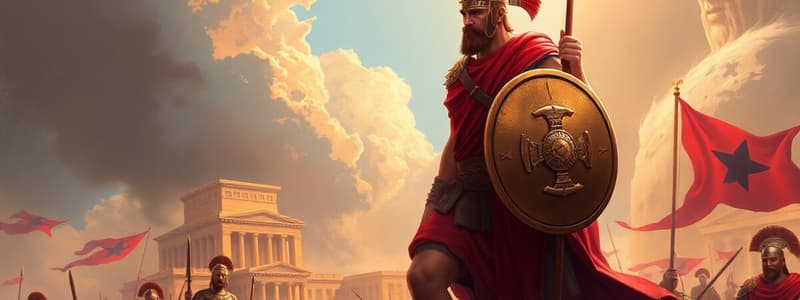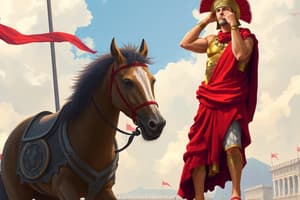Podcast
Questions and Answers
What year did Rome become a republic after driving out the last Etruscan king?
What year did Rome become a republic after driving out the last Etruscan king?
- 509 B.C.E. (correct)
- 44 B.C.E.
- 264 B.C.E.
- 145 B.C.E.
Carthage was one of the major enemies Rome faced during its expansion.
Carthage was one of the major enemies Rome faced during its expansion.
True (A)
Who was the first emperor of Rome?
Who was the first emperor of Rome?
Augustus
The Romans conquered their Latin neighbors in central Italy and eventually controlled the entire _______ peninsula.
The Romans conquered their Latin neighbors in central Italy and eventually controlled the entire _______ peninsula.
Match the following periods of expansion to their events:
Match the following periods of expansion to their events:
Which territory did Julius Caesar conquer during the third period of expansion?
Which territory did Julius Caesar conquer during the third period of expansion?
The Mediterranean was referred to as 'our sea' by the Romans after gaining control over it.
The Mediterranean was referred to as 'our sea' by the Romans after gaining control over it.
What were the major consequences of the civil wars in Rome during the third period of expansion?
What were the major consequences of the civil wars in Rome during the third period of expansion?
The first emperor Augustus started the fourth period of expansion and governed until _______.
The first emperor Augustus started the fourth period of expansion and governed until _______.
Which areas did Rome control by the end of the third period of expansion?
Which areas did Rome control by the end of the third period of expansion?
Flashcards are hidden until you start studying
Study Notes
Overview of Rome's Transition from Republic to Empire
- Growth from a republic to an empire occurred over 500 years, divided into four major periods.
- Transition marked by territorial expansion and shifts in governance and power.
First Period of Expansion (509 - 264 B.C.E.)
- Began in 509 B.C.E. with the expulsion of the last Etruscan king, establishing the Roman Republic.
- Aim: protect borders and acquire land, leading to numerous military conflicts.
- Conquered Latin neighbors in central Italy and defeated Etruscans, ultimately forming alliances with former enemies.
- By 264 B.C.E., Rome and its allies dominated the entire Italian peninsula.
Second Period of Expansion (264 - 146 B.C.E.)
- Rome's growth posed a threat to the Persian Empire and Carthage, a major power in North Africa.
- Fought three significant wars against Carthage known as the Punic Wars.
- Outcomes: Gained control over North Africa, much of Spain, and Sicily.
- Conquest of Macedonia and Greece expanded Rome's influence further.
Third Period of Expansion (145 - 44 B.C.E.)
- Rome became the dominant power in the Mediterranean.
- Territories acquired included Asia Minor, Syria, and Egypt in the east, and Gaul (modern-day France) in the west, led by Julius Caesar.
- The Mediterranean was referred to as "our sea" by Romans, symbolizing their control.
- Increasing civil wars destabilized the republic; generals like Caesar began wielding dictatorial power.
- Julius Caesar declared dictator for life until his assassination in 44 B.C.E., aimed at preserving Senate power but leading to further civil unrest.
- Octavian, Caesar's grandnephew, ultimately seized control and was named Augustus, marking the transformation from republic to empire.
Fourth Period of Expansion (27 B.C.E. - 14 C.E.)
- Initiated with Augustus as the first emperor, focusing on territorial expansion and defense.
- Augustus expanded the empire's borders strategically to natural features for easier defense.
- Subsequent emperors continued to grow the empire, reaching its peak from Britain in the northwest to the Black Sea in the east.
- Each expansion phase came with considerable costs and sacrifices, indicating complex societal perceptions of these events.
Studying That Suits You
Use AI to generate personalized quizzes and flashcards to suit your learning preferences.




